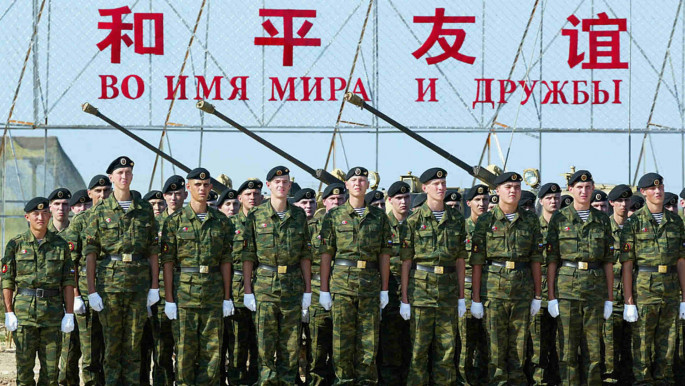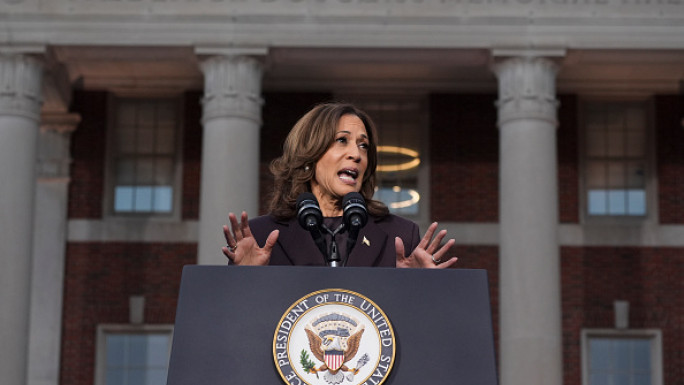
A Sino-Russian love-hate affair
Pakistan, a "major non-NATO ally" is now clamouring to embrace the military bloc's nemesis - a complete turnaround within less than a decade.
The rare visit of a Russian military delegation to Pakistan's Waziristan region, proceeded by joint military drills of commandos, and the purchase of Mil-Mi 35 gunship helicopters and engines for JF-17 multirole fighter jets are a few telling advances that followed America's "pivot to Asia" policy.
In the wake of Washington's long-term partnership with Delhi, many in Pakistan's strategic community envision an emerging alliance with Russia, China and even Iran. But is this a fantasy, or a serious prospect?
Russia may not be a superpower today, but its president Vladimir Putin has established himself as a powerful and shrewd leader. For the "anti-imperialist" regional alliance, the Kremlin's strongman must be fully on board. He is a man on a mission to disregard the liberal worldview, and undermine the current global order.
His disruptive advance has been gradual but firm, from the invasion of Georgia, to Ukraine and the hard-nosed military campaign in Syria, to reported meddling in the US election.
The former KGB spy, who saw the Berlin Wall crumble from his office in East Germany, has nostalgia for the now-vanished 300-year period of Russian expansionism. To him, the breakup of the Soviet Union was a "major geopolitical disaster".
 |
Diplomatically isolated, Russia has been warming up to China for over a decade now |  |
Yet Putin does not believe in direct military control, as his predecessors in the USSR did. He chooses to disrupt the global system with subversion rather than domination. And that's where Pakistan and Iran become relevant.
While the aspirations of Iran are no secret, what benefit does Russia accrue by dragging Pakistan along the same path?
The Kremlin's tryst with Islamabad is anything but the pursuit of noble goals such as global economic integration, or regional stability through forming alliances that could ensure the balance of power.
 |
|
| A Sino-Russian military exercise on August 25, 2005 in eastern China's Shandong Province [Getty] |
Benefiting from the wedge between the US and Pakistan, the 64-year-old Russian strongman seeks to overwhelm Washington in Afghanistan.
It has long been alleged that Russia and Iran have been supporting the Taliban in a bid to have influence over the militia. While Putin's Syria campaign brings strategic dividends, it also entangles the west with the refugee crisis, while denying it a focus for NATO's eastward expansion.
Russia's warmth towards Pakistan aims to neutralise the rivalry of yesteryear, without dishing out much in terms of military technology. It's India that gets to lease the latest Russian nuclear-powered submarines, acquire the S-400 Triumf missile defence system, co-produce medium range BrahMos ballistic missiles and co-develop the T-50 fifth-generation fighter jet.
From Islamabad's standpoint, Pakistan's engagement with Russia helps frustrate India's hopes of globally isolating its neighbour.
Then comes the question of China and Russia joining hands against western "domination". Although Moscow has repeatedly challenged the US and NATO through aggressive military actions ranging from Georgia to Ukraine and Syria, Beijing does not appear to be on board.
 |
The Russian policy of global disruption is anything but in harmony with the Chinese doctrine of peaceful coexistence |  |
The Kremlin's annexation of Crimea exposed the limits of relations between Moscow and Beijing. China neither supported Russia, nor stood with Ukraine. However, Beijing's banks have been abiding by the punitive western sanctions imposed on Moscow.
If China teams up with Russia in vetoing anti-Assad resolutions, including against his repeated, barbaric use of chemical weapons, it does so to contain the US.
During closed-door meetings with Saudi officials, Beijing has reportedly been sounding out options for Assad's future.
While it seeks to preserve the Arab state's territorial integrity, China is open to options, providing Syria does not become a US puppet. Instead of vetoing alongside Moscow, Beijing's abstention from the UN Security Council resolution against Assad's use of chemical weapons demonstrates its independent position on Syria.
| Read more: Russia, the rival superpower? | |
China and Russia have overlapping interests in Afghanistan, which are best served by the withdrawal of US and allied troops. While Moscow wants the US to be humiliated in the country it failed to rein in itself, Beijing has massive investment there, with ambitions to exploit unexplored mineral deposits it desperately seeks to fuel its own economy.
Diplomatically isolated, Russia has been warming up to China for more than a decade now. However, the real breakthrough came after the Ukraine invasion. Amid nose-diving petroleum prices and a crumbling ruble, Moscow turned to Beijing for political support as well as investment.
Since both neighbours settled their border dispute in 2008, Putin lifted a decade-long moratorium against export of the latest military hardware, while also allowing Chinese companies to invest in oil exploration and infrastructure in its Far East and Siberia.
Beijing secured a deal to acquire 24 SU-35 jet fighters and a good number of S-400 Triumf missile defence systems. There has been no word on whether Moscow is also selling Lada-class submarines to China. Fearing the risk of replication, the Kremlin may not ink many more arms deals with its affluent neighbour.
 |
Instability in Central Asia will augur worse for Russia than for China, as the Kremlin's arm is already overstretched |  |
Meanwhile, the Siberian gas pipeline project, still marred in controversy over pricing, will surely miss its 2030 deadline. When asked last week, a Chinese foreign ministry spokesperson denied the formation of any regional alliance involving Russia and its other Asian neighbours.
Nonetheless, the Sino-Russo relationship could yet cement, if Putin accepts its asymmetrical nature, with China being the dominant player with deeper pockets.
But the odds are daunting. Russia is not ready.
Moscow has, for example, warily witnessed the establishment of a new security coordination mechanism for intelligence sharing and consultations among Beijing, Dushanbe, Kabul and Islamabad.
The Kremlin was not invited to the table, while it deems Central Asia as its self-proclaimed exclusive sphere of influence, monitoring China's every move with suspicion.
Had China been not invited, Pakistan would not have sat with Russia to discuss Afghanistan. Russia and China can be at odds if the long-pending transition of power happens in Kazakhstan and Uzbekistan. Moscow has established a comfort zone with the aging regimes, while Beijing does not pin its interests on the ruling families.
China and Russia also have different views about the role the Shanghai Cooperation Organization (SCO) should play. For one, the bloc must preserve its influence in Central Asia while for the other it's a platform to engage as partners.
Instability in Central Asia will augur worse for Russia than for China, as the Kremlin's arm is already overstretched. The tug-of-war for domination can rest amicably if Putin accepts the role of a junior partner in the alliance, though that seems a distant possibility, as long as Putin controls Moscow.
 |
China and Russia have overlapping interests in Afghanistan |  |
The Russian policy of global disruption is anything but in harmony with the ostensible Chinese doctrine of peaceful coexistence. Unlike its larger neighbour, Beijing wants to work with the West. China traded goods worth $598 billion with the US, and $583 billion with Europe in 2015.
The Sino-Russo relation can best be termed as a "marriage of convenience".
"We are not creating a military alliance with China. We are not creating a bloc-based approach, we are trying to create a global approach," The Guardian quoted Putin as saying in June 2015.
As for Iran, the country seems to be in a race to disrupt global stability, a project with which it is in harmony with Russia. The two have helped annihilate an Arab nation, to prop up a failed sectarian tyrant - at the cost of half a million lives.
Yemen has also long been a Kremlin project, which Tehran has merrily adopted. Its reported ambition is to install a favourable government and deploy ballistic missiles targeting Saudi Arabia, while the UAE gains the leverage to disrupt maritime traffic in Bab al-Mandib.
China hasn't and won't play to Iran's stratagem either. It has not deployed military assets in Syria or in Yemen, Chinese policy remains "non-interference" - while backing the Hadi government against the Houthis' military takeover bid.
Beijing nervously notices Iran's growing influence in Pakistan. India and Iran have shared disruptive goals for Gwadar port in Balochistan, as well as China's corridor connecting it with the mainland.
If China is not interested in a regional alliance with Russia, so is Pakistan wary of Iran. There is no compelling overlap of bilateral or multilateral interests. Islamabad can neither afford to complement Russia's agenda in Afghanistan, nor Iran's sectarian policies in the larger Middle East.
Having another ideology-driven disruptive neighbour with fantasies of nuclear weapons besides India can't be in Pakistan's interests.
For Russia and Iran, China and Pakistan have been and will continue to remain competitors rather than spectators; at least as long as Putin and the Ayatollah hold sway in Moscow and Tehran respectively.
Naveed Ahmad is a Doha-based investigative journalist and academic with special focus on diplomacy, security and energy issues. Follow him on Twitter: @naveed360
Opinions expressed in this article remain those of the author and do not necessarily represent those of The New Arab, its editorial board or staff.


![President Pezeshkian has denounced Israel's attacks on Lebanon [Getty]](/sites/default/files/styles/image_684x385/public/2173482924.jpeg?h=a5f2f23a&itok=q3evVtko)



 Follow the Middle East's top stories in English at The New Arab on Google News
Follow the Middle East's top stories in English at The New Arab on Google News


